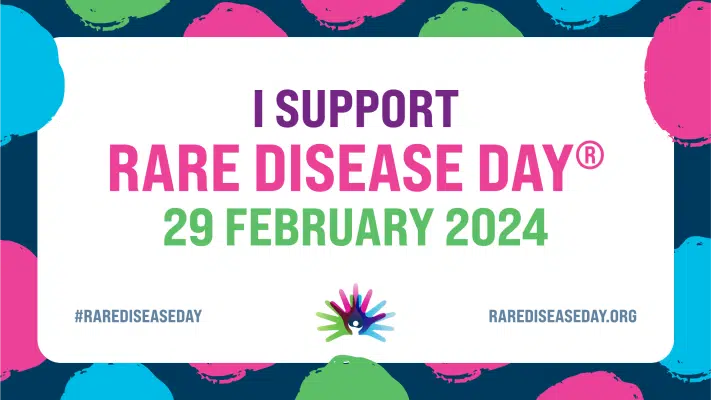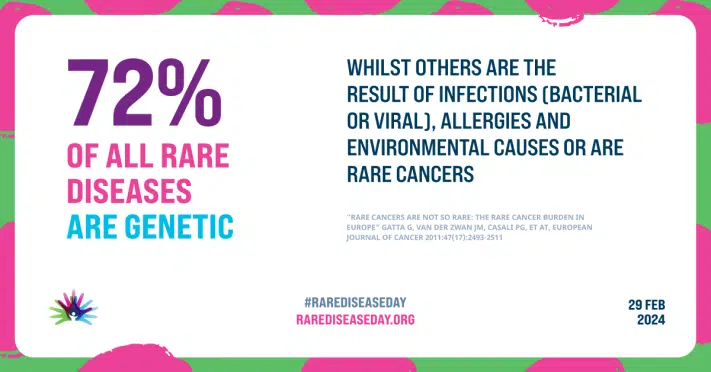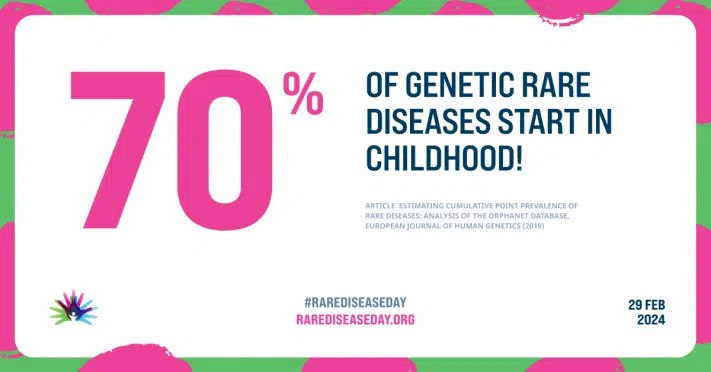29th February 2024
To help raise awareness of Rare Disease Day (29 February 2024), we are delighted to share this Voices blog by Sally Shillaker, Practice Development Lead – Genomics at iHV.

What is rare disease day?
Rare disease day is a day marked each year at the end of February to raise awareness of and show support for people affected by rare disease. The month of February was chosen because it is the only month of the year without 30 or 31 days.
What is a rare disease?
A rare disease is defined as a condition that affects less than 20001 people in the general population. We know of over 7000 rare diseases, with new conditions being identified all the time. So, while a single rare disease is rare, given that there are so many rare diseases, together rare disease can affect a lot of people. Approximately 3.5 million people in the UK live with a rare disease. 75% of all rare diseases are genetic (see Image 1).
Image 1: Graphic from RareDiseaseDay.org
We also know that rare diseases can affect babies and children with 70% of genetic rare diseases starting in childhood (see Image 2). Health visitors may be the first health care professional a family shares concerns with, or the first health care professional to identify a child with a possible rare disease.
Image 2: Graphic from RareDiseaseDay.org

What are the challenges of living with a rare disease?
Sometimes knowledge about a rare disease is limited and therefore professionals may not have much information to support families with.
Sometimes different rare diseases have similar symptoms, and this can result in a lengthy journey to diagnosis for people affected. Health visitors have a vital role in supporting families through the diagnostic odyssey – see the iHV Good Practice Points eXtra on Understanding Genomics for more information, in particular Supporting families through the ‘diagnostic odyssey’ (Genomics GPP3).
Health visitors have an important role in providing support to families of babies and young children with rare diseases, supporting them to access services and helping the family to cope. They can connect the family with local support, for example the community paediatrician, local genomics teams and voluntary sector organisations.
All families are different and it is important to tailor support to meet the family’s individual needs and context. People with a rare disease can feel very isolated, and finding peer support is difficult. They report that healthcare professionals do not always listen to them. Sometimes, there is no treatment for a rare disease.
What can we do to support rare disease day?
Raise awareness about the day and therefore rare disease with colleagues.
Visit What is Rare Disease Day? – Rare Disease Day 2024 for more information. There is a lot you can do to promote the day and there are resources you can find to help here, including a rare disease backdrop if you are in a virtual meeting.
Let’s show we care about rare disease and those affected this year!
Sally Shillaker, iHV Practice Development Lead – Genomics
References
- Department of Health and Social Care (2021) Policy Paper. The UK Rare Diseases Framework. https://www.gov.uk/government/publications/uk-rare-diseases-framework/the-uk-rare-diseases-framework

